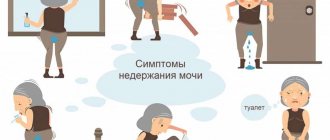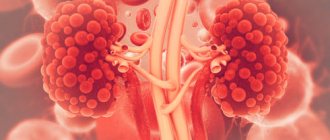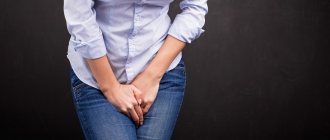Content:
- Classification of pathology
- Causes of enuresis in alcoholics
- Who is prone to enuresis
- Survey
- Treatment of alcoholic enuresis
Enuresis after alcohol is quite common. The condition is unpleasant and shameful. It causes many psychological and physiological problems in alcohol addicts.
The bad news is that many patients are in no hurry to receive qualified medical care. They drink for weeks or even months and do not find the energy or time to visit a doctor. In addition, in order to cure alcoholic enuresis, you will have to give up drinking forever. Not every addict is ready to undergo alcoholism treatment and get coded.
Doctors never tire of repeating: if urinary incontinence occurs due to alcohol abuse, it must be treated.
Postponing a visit to a specialist until later contributes to the progression of pathology and creates optimal conditions for the development of other diseases of the genitourinary system.
Classification of pathology
Explaining the connection between alcohol and enuresis, doctors name three main types of the disease:
- Bedwetting.
The problem manifests itself in all its glory in the dark, when a person is sleeping. An alcohol addict does not wake up to go to the toilet. As a result, he relieves himself directly into the bed. - Daytime incontinence.
This type of enuresis in adult men reminds itself during the day. The person is unable to endure. It would seem that the desire to visit the toilet appeared quite recently, but the patient does not have time to get to the “cherished” place. Such situations deprive the alcoholic of self-confidence and often drive him into progressive depression. - Mixed type.
The most difficult. Incontinence reminds itself both day and night. “The problem of wet pants” is pronounced and interferes with normal life. - In general, enuresis,
as a medical disease, occurs: - Associated with emotional/physical stress.
A person gets into a tricky situation when he laughs loudly or tries to lift weights. The problem is sometimes caused by playing sports. - Urgent.
The problem of men of retirement age. Very often their enuresis is accompanied by a stroke, amnesia or diabetes mellitus. An urgent disorder has a peculiarity - a person feels that he wants to go to the toilet, but does not have time to get there. - Caused by severe overcrowding of the bladder.
A person suffers for a long time and then does not have time to get to the toilet. - Postoperative.
Associated with recent surgery for an enlarged prostate or problems with the urinary system. Typically, this type of disease does not require treatment, as it goes away on its own when postoperative rehabilitation comes to an end. - Alcoholic.
Here we are talking about enuresis in adults after alcohol. An alcohol addict takes such a large dose of alcohol that he loses control over his own body. It happens that he feels the urge to urinate, but is unable to get up and walk in the direction of the bathroom.
Given the variety of provoking factors, it is important to establish the true cause of the disease. The connection between alcoholism and the problem is not always direct. There are situations when a person drinks, but during the diagnosis it turns out that he developed incontinence for a completely different reason. Therefore, any person suffering from “wet pants” should definitely undergo a comprehensive medical examination.
How to treat cystitis after alcohol
Treatment of cystitis caused by alcohol abuse should be comprehensive:
- taking antibacterial drugs;
- anti-inflammatory if necessary;
- herbal medicines;
- adherence to a diet (complete rejection of bad habits, exclusion from the daily diet of foods that irritate the mucous membrane).
First aid for cystitis at home is to significantly increase fluid intake.
Suitable for drinking:
- still water;
- cranberry and lingonberry fruit drinks;
- compotes;
- herbal infusions.
There are a large number of recipes for preparing herbal decoction against cystitis, which not only has an anti-inflammatory effect, but also improves blood circulation. You can find the most suitable recipe in this article.
When choosing antibacterial agents, you should pay attention to the drug “Monural”. It must be taken once. Most pathogenic microorganisms have low resistance to the active substance of this drug.
This means that bacteria cannot resist the harmful effects of fosfomycin. Therefore, Monural is a first-line drug for the treatment of urinary tract infections.
Among the uroseptic agents, Furamag can be distinguished. The effect of taking this remedy occurs within a few hours, and the woman experiences significant relief. "Furamag" is usually taken 1 t. 3 times a day, the course is a week. In most cases, the drug is well tolerated; in rare cases, a severe allergic reaction and other side effects are observed.
It is also worth paying attention to the use of vaginal suppositories with an anti-inflammatory effect: “Urosept”; “Betadine”, etc. A list of popular drugs can be found here.
The development of cystitis after alcohol is often accompanied by the appearance of thrush, this is due to the negative effect of strong drinks on the vaginal microflora. If personal hygiene rules are violated, Candida fungi can colonize the urethra, causing inflammation in the bladder.
In case of severe damage to the mucous layer in the organ, lavage of the bladder with drugs that improve microcirculation and have a disinfectant, antimicrobial and antispasmodic effect may be prescribed.
Among herbal preparations, “Canephron N” and “Urosept” are popular. They need to be taken for a long time, and if necessary, after some time, repeat the course of treatment.
If cystitis is expressed by severe pain, then taking “No-shpa” and “Papaverine” is allowed. To adjust the necessary treatment regimen, a consultation with a doctor is required.
Causes of enuresis in alcoholics
According to the observations of narcologists, exacerbation of the disease in drinkers most often occurs during binges.
. On such days, a person is focused on only one thing - searching for the next dose of alcohol. He is poorly oriented in the surrounding space, does not understand what is happening around him, and is unable to control his emotions and actions.
The larger the dose of alcohol taken, the more severe the intoxication. At some point, the brain stops controlling the body. Basic reflexes are impaired. Parallel:
- tachycardia develops;
- blood pressure increases;
- pulse quickens;
- disruptions occur in metabolic processes;
- the conductivity of nerve fibers decreases;
- the central nervous system stops working normally.
It is very important to treat binge drinking with the support of a qualified narcologist. The doctor will help interrupt the binge drinking state and prescribe treatment that will improve the functions of internal organs and create conditions for preventing the development of enuresis.
Who is prone to enuresis
Not every alcoholic experiences urinary incontinence. The fact is that there are factors that create conditions for the development of this disease. Among them:
- Age.
The older a person is, the worse the condition of his pelvic floor muscles. - Emotional condition.
If a drinker is very nervous, this has a bad effect on the functioning of the entire body. - Infections.
Bladder pathologies are especially dangerous. If they are not treated, then very soon the infection will disrupt the functioning of the organ. - A history of traumatic brain injury.
It has been observed that people who have suffered a TBI in the past are more likely to suffer from alcoholic enuresis. - Bladder condition.
It is important that there are no stones or cancerous tumors inside. - Prostate condition.
If you have had surgery in the past, you are much more likely to experience urinary incontinence.
Survey
The urologist cannot prescribe treatment until he conducts a diagnosis and confirms the preliminary diagnosis with its help. Among the standard diagnostic procedures:
- general analysis of urine and blood;
- Ultrasound of the abdominal organs;
- cough tests with a full bladder;
- cystometry.
An in-person urological examination is also mandatory.
If the patient’s mental state is of concern, he is referred for consultation to a psychotherapist or neurologist. If there are concomitant endocrine pathologies, it is important to consult an endocrinologist.
Diagnostics
Without fail, the doctor directs the patient to undergo a general urine test. With cystitis, patients have an increased number of leukocytes.
Damage to the mucosa can also cause the accumulation of red blood cells. During the study, it is often possible to detect the type of pathogenic bacteria that provoked the development of inflammation.
In some cases, urine analysis is done according to Nechiporenko. The cellular composition of the material is studied.
It is more often performed if the clinical picture of the disease is blurred. From female representatives, a vaginal smear is also taken for further study.
Treatment of alcoholic enuresis
It is important that therapy is gradual and comprehensive. Typically it consists of:
- Taking medications
selected individually. Anti-inflammatory drugs, antibiotics, and uroseptics are used. Sedatives, hypnotics, and antidepressants can also be used. If the patient complains of pain in the abdominal area and the pain is quite severe, antispasmodics and analgesics are prescribed for him. - Treatment of the disease that
provoked enuresis. In this case it is alcoholism. You cannot cure urinary incontinence by continuing to drink. Therefore, the patient is offered different coding options. He is told about the importance of completely abstaining from drinking alcoholic beverages. After coding, the patient must undergo rehabilitation. - Physiotherapy.
They can be done on an outpatient basis, but it is better if the addict stays in a hospital for some time. For enuresis, applications with paraffin, acupuncture, electrophoresis, and ultrasound are effective. - Exercise therapy.
It is very important to strengthen the pelvic floor muscles. For this purpose, the patient must perform special therapeutic exercises. Excellent results can be achieved by lifting your legs up, squats, and “bicycles.”
It will be possible to achieve positive dynamics much faster if the drinker begins to eat properly and observe a sleep-wake schedule. It is important not to eat anything spicy, fatty or smoked.
You need to go to bed and wake up at approximately the same time.
If you are faced with alcoholic enuresis, stop and think: what will happen next? Don't let your body collapse. Be sure to start treatment.
Symptoms of cystitis after alcohol
When cystitis develops after drinking alcohol, a woman experiences the following symptoms:
- feeling of pain in the perineum when urinating;
- discomfort in the lower abdomen;
- too frequent urge to go to the toilet, while the portion of urine may be several drops;
- general malaise;
- change in urine color (becomes cloudier);
- with severe damage to the mucous membrane (most often with systematic consumption of alcoholic beverages), blood streaks may appear in the urine.
If signs of the disease appear, measures must be taken immediately to stop the inflammation.









